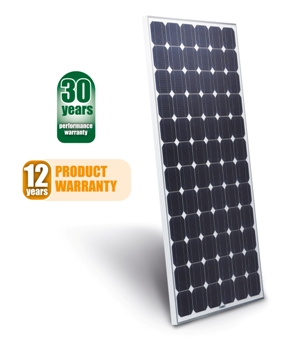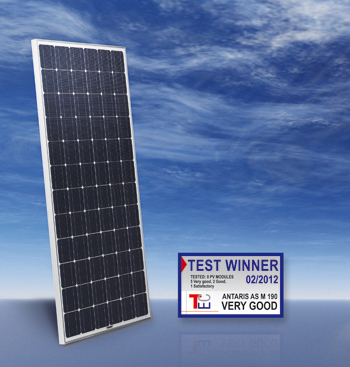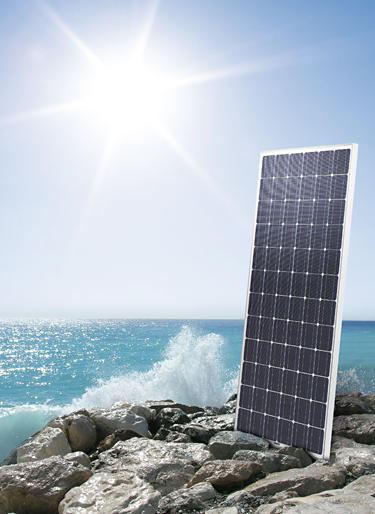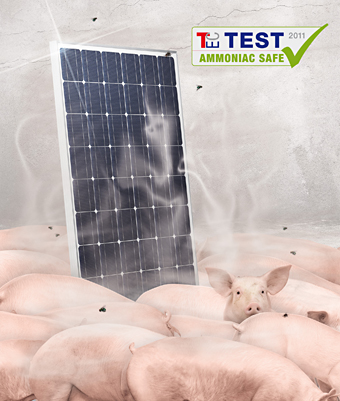 Solar panels have to be reliable, efficient AND economically priced to make a solar power system provide the best returns for decades to come. With the mono- and polycrystalline high performance solar module series from ANTARIS SOLAR you benefit from the latest German PV technology at competitive prices – to make the most efficient use of the power of the sun.
Solar panels have to be reliable, efficient AND economically priced to make a solar power system provide the best returns for decades to come. With the mono- and polycrystalline high performance solar module series from ANTARIS SOLAR you benefit from the latest German PV technology at competitive prices – to make the most efficient use of the power of the sun.
For maximum security, for you AND your customers, ANTARIS SOLAR offers a unique 30 year performance and 12 year product warranty. Our financial stability means that we will be there in years to come to ensure all warranties are honoured with our locally backed customer services. Extensive quality testing by renowned German institutions like TÜV Nord, PICON Solar or TEC Institute ensures that ANTARIS SOLAR panels conform to highest German and international standards.
These are all good reasons to partner with us – and don’t forget that ANTARIS SOLAR was awarded test winner in the last module comparison conducted by TEC Institute.
And there is even one more benefit: Our modules are also available in black version to meet aesthetic preferences of even the most sophisticated customers.
 For the large range of photovoltaic modules available, objective performance tests and product comparisons provide valuable guidance with regard to product selection. With the monocristalline AS M 190 module, ANTARIS SOLAR participated in a long-term study by the TEC Institute for Technical Innovations in which modules from eight different providers were tested on the basis of their performance in the event of low solar radiation. Good performance even in the event of low solar radiation is decisive for achieving an optimum annual yield, especially in regions with large seasonal variations in solar radiation. “Very good” rating for ANTARIS SOLAR module With a yield of 265.8 kWh/kWp, the monocristalline AS M 190 module from ANTARIS SOLAR supplied the highest energy yield per individual module and, rated as “very good”, emerged as the test winner. Four module types from other providers were close behind the AS M 190. The comparison test took place between 1 September and 30 November 2011. During this period, the sun was very low in the sky at the test location in Germany, with the global radiation being considerably lower than in the summer months. To conduct the test under real conditions, the modules were installed on a roof. The modules faced due south with an angle of inclination of 30 degrees so that there was no shading. The modules tested were connected in separate strings, each of two or three modules of the same type, depending on the module voltage and the MPP voltage of the inverters. One inverter was used for each string. It was also ensured that the cable length of the test strings was as consistent as possible. In addition to the module power, the weather conditions (temperature, air pressure, wind, precipitation, humidity) and the global radiation were measured throughout the entire testing period. This alignment of the weather situation and the module yield performance enabled objective assessment of the actual energy yields of the tested solar modules.
For the large range of photovoltaic modules available, objective performance tests and product comparisons provide valuable guidance with regard to product selection. With the monocristalline AS M 190 module, ANTARIS SOLAR participated in a long-term study by the TEC Institute for Technical Innovations in which modules from eight different providers were tested on the basis of their performance in the event of low solar radiation. Good performance even in the event of low solar radiation is decisive for achieving an optimum annual yield, especially in regions with large seasonal variations in solar radiation. “Very good” rating for ANTARIS SOLAR module With a yield of 265.8 kWh/kWp, the monocristalline AS M 190 module from ANTARIS SOLAR supplied the highest energy yield per individual module and, rated as “very good”, emerged as the test winner. Four module types from other providers were close behind the AS M 190. The comparison test took place between 1 September and 30 November 2011. During this period, the sun was very low in the sky at the test location in Germany, with the global radiation being considerably lower than in the summer months. To conduct the test under real conditions, the modules were installed on a roof. The modules faced due south with an angle of inclination of 30 degrees so that there was no shading. The modules tested were connected in separate strings, each of two or three modules of the same type, depending on the module voltage and the MPP voltage of the inverters. One inverter was used for each string. It was also ensured that the cable length of the test strings was as consistent as possible. In addition to the module power, the weather conditions (temperature, air pressure, wind, precipitation, humidity) and the global radiation were measured throughout the entire testing period. This alignment of the weather situation and the module yield performance enabled objective assessment of the actual energy yields of the tested solar modules.

